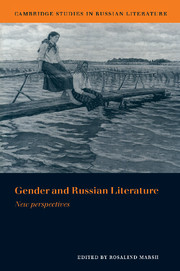Book contents
- Frontmatter
- Contents
- Notes on contributors
- Acknowledgements
- 1 Introduction: new perspectives on women and gender in Russian literature
- PART I HISTORICAL AND BIOGRAPHICAL PERSPECTIVES
- PART II THE PERSPECTIVE OF LITERARY CRITICISM
- 12 The silence of rebellion: women in the work of Leonid Andreev
- 13 Poor Liza: the sexual politics of Elizaveta Bam by Daniil Kharms
- 14 The crafting of a self: Lidiia Ginzburg's early journal
- 15 Voyeurism and ventriloquism: Aleksandr Velichanskii's Podzemnaia nimfa
- 16 Thinking self in the poetry of Ol′ga Sedakova
- 17 Women's space and women's place in contemporary Russian fiction
- Index
- CAMBRIDGE STUDIES IN RUSSIAN LITERATURE
13 - Poor Liza: the sexual politics of Elizaveta Bam by Daniil Kharms
Published online by Cambridge University Press: 06 July 2010
- Frontmatter
- Contents
- Notes on contributors
- Acknowledgements
- 1 Introduction: new perspectives on women and gender in Russian literature
- PART I HISTORICAL AND BIOGRAPHICAL PERSPECTIVES
- PART II THE PERSPECTIVE OF LITERARY CRITICISM
- 12 The silence of rebellion: women in the work of Leonid Andreev
- 13 Poor Liza: the sexual politics of Elizaveta Bam by Daniil Kharms
- 14 The crafting of a self: Lidiia Ginzburg's early journal
- 15 Voyeurism and ventriloquism: Aleksandr Velichanskii's Podzemnaia nimfa
- 16 Thinking self in the poetry of Ol′ga Sedakova
- 17 Women's space and women's place in contemporary Russian fiction
- Index
- CAMBRIDGE STUDIES IN RUSSIAN LITERATURE
Summary
In her book, The Originality of the Avant-Garde and Other Modernist Myths, Rosalind Krauss argues that innovation in the arts is frequently anything but; apparently new trends, she suggests, may amount to nothing more than the repetition of old trends. Although Krauss restricts herself by and large to the visual avant-garde, what she says may also be said to apply to much avant-garde writing. One text for which her argument seems particularly appropriate, at least in its sexual politics, is Daniil Kharms's 1927 play Elizaveta Bam.
Daniil Kharms (1905–42) was arguably one of the most important and influential literary figures of 1920s and 1930s Leningrad. Although his writing ran from approximately 1925 to his death in 1942, he is perhaps best remembered as a founder member of the outlandish group of Leningrad writers known generally as Oberiu (a distorted acronym of ‘Ob″edinenie real′nogo iskusstva’, or ‘The Association of Real Art’), in existence during the comparatively brief period 1927–30. It was during the first public performance of Oberiu, on 24 January 1928, at the Leningrad Press Club, that Kharms's play Elizaveta Bam was premièred. The declaration of the group's aesthetic principles, which was also part of the show, might be said to bear out Krauss's thesis concerning the avant-garde and its ambiguous attitude towards convention: on the one hand, ‘Oberiu’ was utterly dismissive of what it called ‘art of the old schools’; on the other hand, it identified the balagan, or medieval Russian folk theatre, as the art form on which any genuine theatre should be based: ‘balagan is theatre’, it proclaimed. Kharms's play Elizaveta Bam is itself full of such ambiguities, and never more so than in its sexual politics, as we shall see.
- Type
- Chapter
- Information
- Gender and Russian LiteratureNew Perspectives, pp. 244 - 262Publisher: Cambridge University PressPrint publication year: 1996

